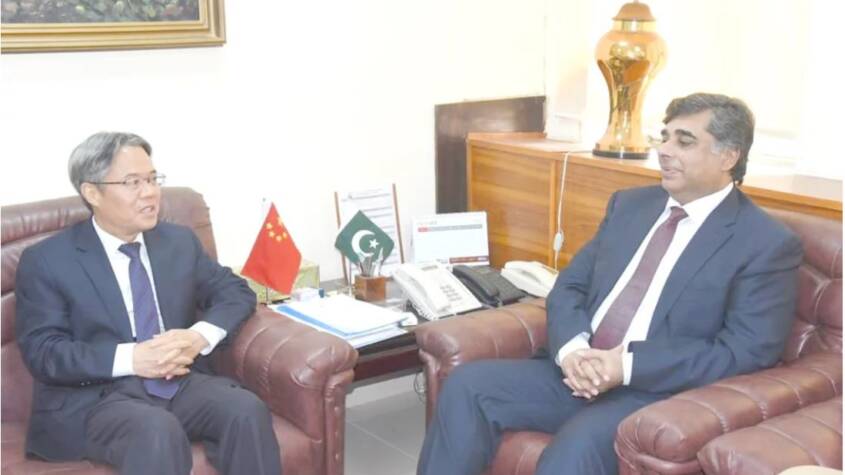CPEC second phase: Minister, China’s envoy discuss ways to expand cooperation
Dr. Gohar Ejaz, Pakistan’s Minister for Commerce & Industry, recently met with the Chinese ambassador to discuss economic cooperation between the two countries, with a specific focus on trade and investment. The discussions centered on the second stage of the China-Pakistan Economic Corridor (CPEC), with Dr. Ejaz highlighting the advanced progress in the first phase and urging private sectors in both nations to capitalize on the groundwork laid by their governments. The Minister emphasized a new phase in the Pak-China relationship, encouraging Chinese private sector investment, particularly in Special Economic Zones (SEZs) in Lahore and Karachi. Dr. Ejaz also revealed plans for a Northern SEZ to connect Urumqi with Pakistan and announced the creation of Export Advisory Councils for Textile and non-Textile Sectors. A delegation, including business leaders, is set to visit China in December 2023 to foster trade, investment, and joint ventures. The discussions also touched on key projects such as ML1, Karakoram Highway realignment, and the significance of Gwadar Port in Pakistan’s economic development.
Dr Gohar Ejaz, Minister for Commerce & Industry, has met ambassador of China to Pakistan to discuss Pakistan-China economic cooperation especially in fields of trade and investment.
The focus of the discussions revolved around the implementation of the China-Pakistan Economic Corridor (CPEC), which has now entered its second stage. Dr Ejaz informed the ambassador that the first phase of CPEC is at an advanced age at inter-governmental level which has helped Pakistan to develop the infrastructure, road network, power plants to meet energy needs, and now the time has come for the private sectors of both countries to gear up to realise the benefits of the ground that has been prepared by the two governments.
Minister Gohar Ejaz heralded the start of a new relationship initiated by consensus between President Xi Jinping and Prime Minister Anwar ul Haq Kakar on the second stage of CPEC. He urged the Chinese private sector to invest in Pakistan, with particular attention to SEZs in Lahore and Karachi. He also informed the ambassador that he met the Ambassador Sha Zu Kang, President of Pak China Friendship Association, in China and they also agreed that this was the way forward.
Minister Ejaz highlighted the importance of private sector collaboration as the next step in strengthening the Pak-China relationship, revealing plans for the development of a Northern SEZ to link Urumqi with Pakistan and the availability of the Lahore and Karachi SEZs for further development. He informed the ambassador that as a part of his “Vision Pakistan: Road to $100 billion Exports”, he has created two separate Export Advisory Councils for Textile and non-Textile Sectors respectively. The Councils would provide recommendations to the Ministry of Commerce on matters affecting export and would propose measures for export enhancement. These would meet on a monthly basis or with higher frequency, if required.
“SMEs and the non-textile sectors are the key to Pakistan’s prosperity and progress” said Dr. Ejaz. He informed the ambassador that as a follow-up to the visit of the Prime Minister to China last month, he will be taking a delegation of the three main groups to China from 11 to 15 December, 2023. In addition to the members of the two Export Advisory Councils, the third group would include the CEOs of the top industrial groups in Pakistan. These include Fawad Ahmed Mukhtar, Muhammad All Tabba, Waqar Ahmed Malik, Abdul Samad Dawood, Raza Mansha, Shahzad Asghar Ali, Samir Chinoy, Amir Fayyaz Sheikh, Shahbaz Yaseen Malik, Ahsan Bashir, Syed Hyder Ali and Farooq Naseem.
This multi-segmental delegation representing the business sector of Pakistan would hold meetings with their counterparts in China for trade and investment and formation of joint ventures. The Chinese ambassador acknowledged the crucial role of Commerce Ministry in promoting Pak-China trade and increasing Pakistani exports. He further discussed the importance of key projects, including the upgradation of ML1 and the realignment of the Karakoram Highway. The significance of the northern region, particularly the work on the Khunjerab Pass, was also highlighted. The commerce minister emphasized the need to develop and operate Special Economic Zones and reiterated the importance of Gwadar Port. “Pakistan is focusing on sectors such as agriculture, mining, new energy, and IT under the framework of the SIFC” said Dr Ejaz. He further stated that the Ministry of Commerce played a crucial role especially concerning SEZs and the production of value-added goods.
Chinese envoy Zhao Shiren urges students to uphold integrity and strengthen China-Pakistan ties
LAHORE:The Consul Generals from several countries and other distinguished guests attended …











